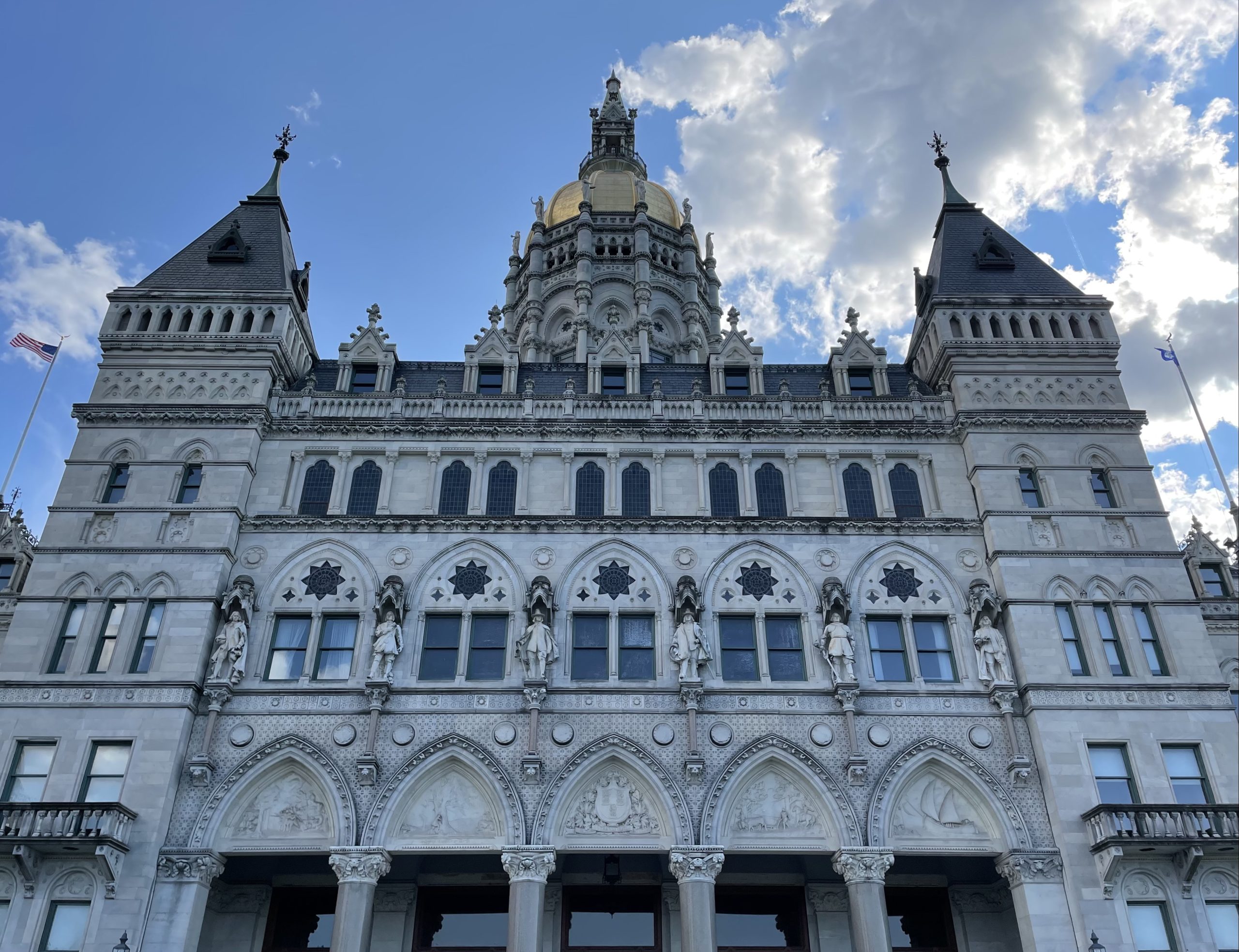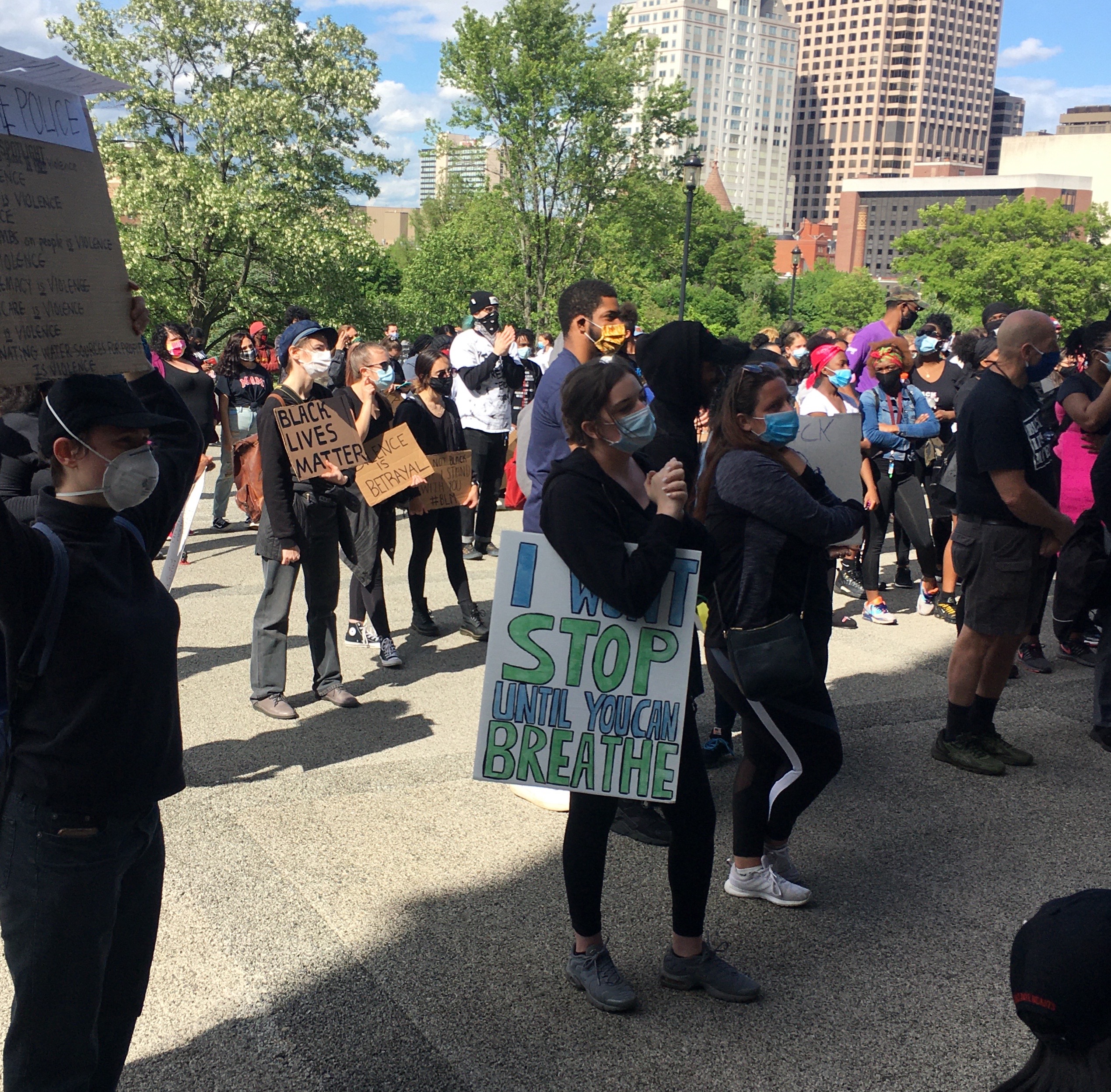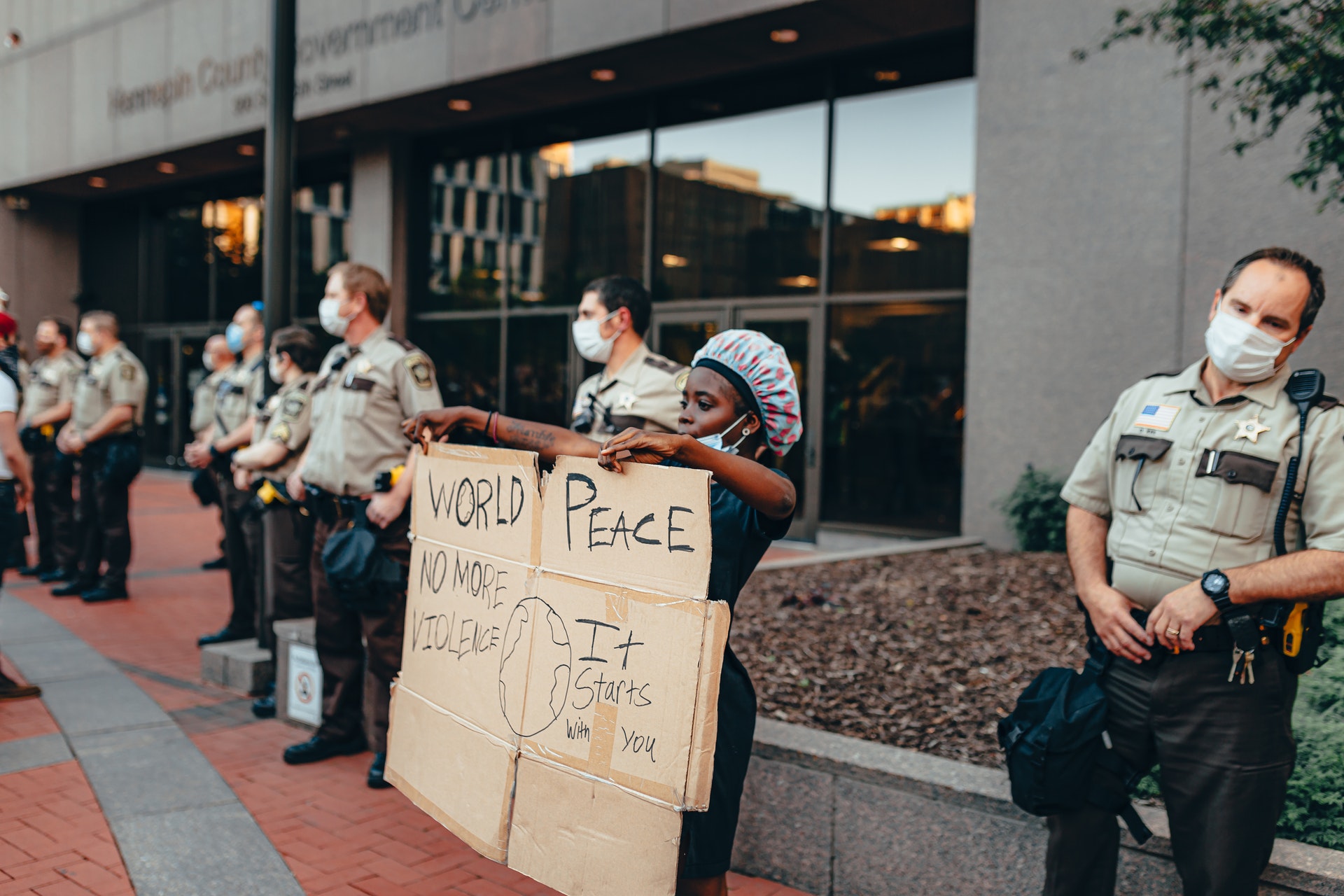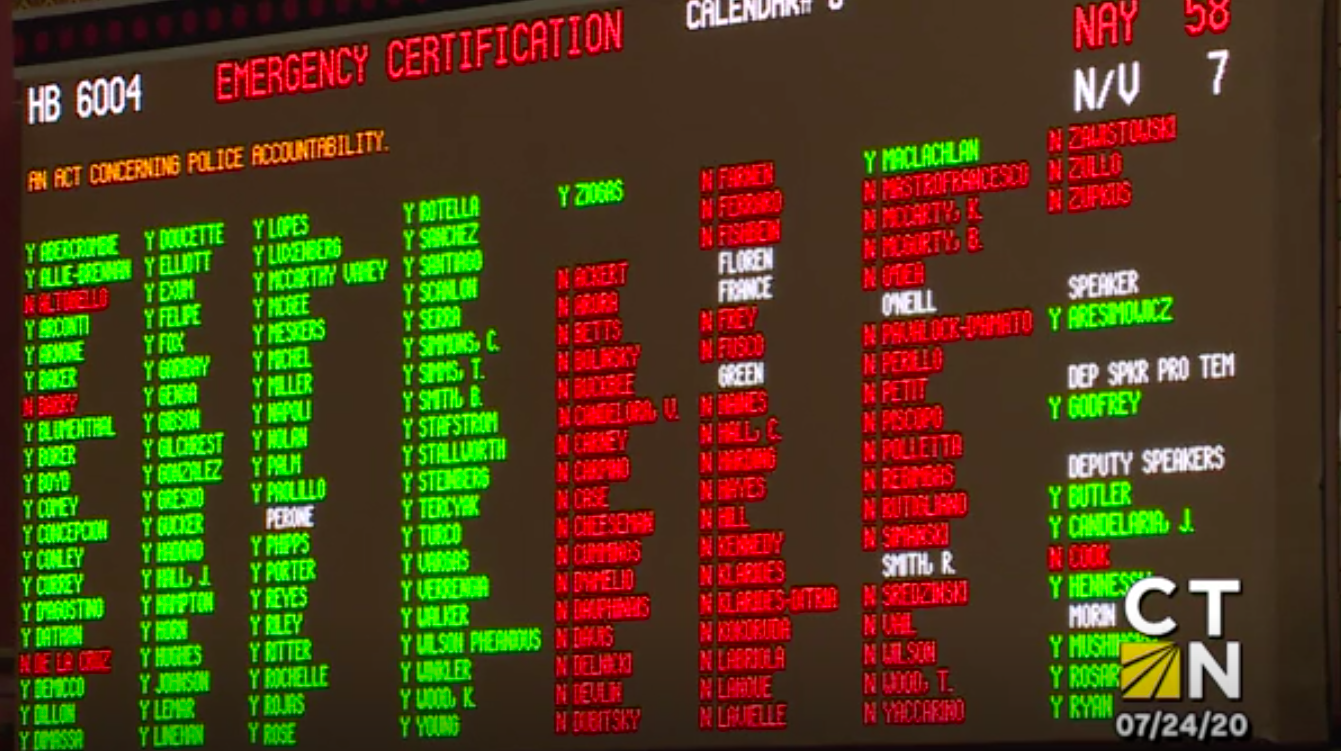On August 18, police officers in Westport voted 42-5 in favor of switching union representation from AFSCME Council 4, AFL-CIO, to the National Fraternal Order of Police, the nation’s largest police union.
And they were not the first to do so this year.
According to the State Board of Labor Relations, six police unions in Connecticut have voted to jump ship from their current union for the Fraternal Order of Police. Among them, North Branford, Farmington, Rocky Hill and New Canaan.
Police unions in Avon and Wolcott have also switched to the International Brotherhood of Police Officers.
Unions voting for new representation – or going independent without a larger affiliate union — is not uncommon. However, the concentration of police unions switching representation over the course of 2021 shows not just an increase in the number of police unions choosing new representation, but, in particular, choosing the Fraternal Order of Police.
Between 2015 and 2020, police unions in 15 different municipalities switched union affiliation — which, typically, can only take place at the end of a labor contract — and four of them joined the Fraternal Order of Police. The rest largely voted to join either the Nutmeg Independent Public Safety Employees Union or the C.O.P.S. division of the United Public Service Employees Union.
But over the course of 2021 so far, eight police unions have switched representation and there are reasons at both the state and national level that those police unions are, by and large, choosing the Fraternal Order of Police.
Sgt. Corey Lemmons, president of the North Branford police union, says that the decision to switch from AFSCME Council 4 to the Fraternal Order of Police was a difficult one; they genuinely liked their union representative, who was a retired police officer, and thought he did a good job for them.
But there were two points that drove North Branford police officers to change representation: the legal protections offered by the Fraternal Order of Police and Connecticut’s Police Accountability Act, which was passed during a July 2020 special session.
“The major push was the accountability bill,” Lemmons said in an interview. “Fraternal Order just offered us more services for almost the same amount of money, so they cover us more if there are disciplinary hearings, any civil suits that come from them changing the qualified immunity. We just had better protection because [FOP] deals only with police, whereas AFSCME Council 4 has chefs and clerical and other types of work. So their agenda is just on us.”
The decision by North Branford police to switch representation was decided by a 17-1 vote on February 25, 2021.
A Matter of Protection and Representation
Following the killing of George Floyd in Minneapolis in 2020, mass protests erupted across the country calling for more police accountability. There were calls to “defund the police,” by cutting police department allocations and shifting the money to more social services, and a push to end qualified immunity, which protects officers from being held personally liable for on-the-job actions in most cases.
State legislatures responded by passing new bills aimed at police accountability. In Connecticut, the General Assembly convened a special session in July of 2020 to pass the Police Accountability Act, a move that was largely opposed by police officers and police unions who held a protest at the Capitol in opposition.
Among other things, the act expanded the reasons an officer can have his or her certification by the Police Officer Standards and Training Council revoked, including “undermining public confidence in law enforcement or excessive or unjustified force,” according to the legislative summary.
The bill also made some changes to qualified immunity, establishing a civil cause of action against police officers who “deprives an individual or class of individuals of state law’s equal protection or privileges and immunities,” according to the bill summary.
Essentially, it allows a police officer to be sued personally for certain acts committed on the job if those acts were found to be “deliberate, willful, and committed with reckless indifference.”
The bill was passed under emergency certification and was opposed by all Republicans and a few Democrats.
The national movement and rhetoric surrounding police and Black Lives Matter, as well as Connecticut’s special session passage of the Police Accountability Act, have fed into a desire by police officers to ensure that they are both protected on the job and that their dues money is going to support law enforcement rather than aiding in calls to defund police.
And that has left some police unions looking for new representation with the Fraternal Order of Police, according to Jack Parlon, labor specialist for the National Fraternal Order of Police.
“The police reform bills, especially in New England, have reawakened each police officer to think of how vulnerable they really are,” Parlon said in an interview. “The whole environment has changed here dramatically in the last five years.”
The Fraternal Order of Police is the largest exclusively-police union in the country, with 375,000 members. Their union officials, negotiators and representatives are all former police officers, including Parlon, who spent his career working for the Boston Police Department.
“All our contract negotiations, all our grievance processing, all our interest arbitrations, all our grievance arbitrations are done by experienced police officers with extensive labor backgrounds,” Parlon said. “They’ve been schooled in labor. They’ve held office in various police unions. That’s fairly unique with us.”
The union also offers police officers unlimited legal protection for criminal, civil and administrative hearings at no cost to the officer outside of their dues, a feature that Connecticut officers may find appealing with the prospect of being held personally liable for on-the-job incidents.
AFSCME also offers legal protection through its Public Safety Protection Plan known as PORAC, a collaboration between AFSCME and the Peace Officers Research Association of California, which offers legal representation and coverage up to $1 million.
However, Lemmons said that FOP’s coverage was better and more extensive for a small increase in dues costs.
But the shift from a union like AFSCME, which still has a large share of Connecticut’s police unions, is not divorced from the larger political context of which politicians, policies and movements those unions support.
“Why would you give your money to an alleged union that is antithetical to everything you stand for? What does AFSCME support? They support the Black Lives Matter movement, which is antithetical to everything we do; they support every left-wing movement in the country,” Parlon said. “That’s what they’re about and that’s fine but we, as a group, don’t want to contribute to that. We don’t want our money going to that.”
Reached for comment, Troy Raccuia, AFSCME Council 4’s Director of Collective Bargaining, said the Fraternal Order of Police’s representation falls short.
“They should change their name to MIA (Missing In Action) because they are almost completely missing in action at the State Capitol when it comes to protecting police officers’ pay, pension, health care and bargaining rights,” Raccuia said in an email. “FOP charges police officers more for their services, but falls drastically short when it comes to doing the hard work our union and others do to defend and advance the economic and workplace interests of the officers we proudly represent.”
But, as Sgt. Lemmons said during the interview, despite favorable representation by AFSCME, the Police Accountability Act struck a deeper nerve.
“Some of the big members of Council 4 were the spearhead of the accountability bill. Its not that we’re against the bill, its that there was no dialogue with the police about it,” Lemmons said. “There’s problems with the bill.”
A Polarized Political Campaign
During the 2020 presidential campaign and election, the Fraternal Order of Police gave their endorsement to Donald Trump, while unions like AFSCME, the AFL-CIO and SEIU supported Joe Biden.
There was little surprise in those unions’ support for Biden; over the years, major unions like AFL-CIO and SEIU have shifted to become money machines for progressive politics at both the state and national level and Biden had focused much of his attention on supporting unions.
The 2020 election year was one beset with strife, protests and clashes between opposing parties, with much of the chaos revolving around George Floyd and Black Lives Matter, complicated with a world-wide pandemic that saw hundreds of thousands die and government lockdowns spur massive unemployment.
It was a mess and the political parties – what they stood for, who they supported and who they were supported by – became lines drawn in the sand.
Republicans seized on a “law and order” rallying cry and supporting the police, while Democrats were much more supportive of the Black Lives Matter movement and instituting police reforms. Where a national union stood politically would have repercussions down the line.
Nationally, AFSCME’s political action committee spent $21.4 million during the 2020 election, with $2.3 million going to Democratic party candidates and $6,500 going to Republican candidates. The rest of the money was largely spent on independent expenditures and donations to other committees, according to Open Secrets.
Likewise, SEIU’s political action committee spent $75.4 million, with nearly 100 percent of the spending going for Democrats or opposing Republicans.
While the Fraternal Order of Police gave their endorsement to Donald Trump, they spent very little on politics during the 2020 cycle – a mere $67,103, with 83 percent of those political donations going to Republicans.
But the divisiveness of the elections and the cultural moment left AFSCME in a bit of a bind; roughly 90,000 of their members are police officers. In various statements, AFSCME has said that it does not support defunding any public services, but also supports the Black Lives Matter movement.
It’s a difficult needle to thread at a time when nuance and balance is often overlooked in favor of an all-or-nothing, nuke-the-other side mentality.
“We will not rest until our leaders answer our calls for racial justice,” AFSCME President Lee Saunders said in a press statement. “Once again, we’re being presented with a false choice, which our union has always categorically rejected: the idea that public safety is incompatible with basic civil rights. The truth is: a healthy society can and must have both.”
AFSCME state and local affiliates were active in the Black Lives Matter movement, organizing and joining in protests throughout 2020. Some of AFSCME’s membership wanted the union out of policing altogether and were angered when AFSCME refused to consider several resolutions during their convention that would, among other things, disaffiliate its police unions.
SEIU was more forceful in their support for Black Lives Matter, issuing a resolution that called for supporting the organization’s demands at the local, state and federal level; mobilizing demonstrations and calling for divestment and demilitarization of the police, according to a press release.
While SEIU is largely comprised of healthcare and service workers, it also has its fingers in police unions.
The International Brotherhood of Police Officers, which has 15,000 members, is part of the National Association of Government Employees, an affiliate of SEIU. Political donations made by IBPO members are funneled to the Committee on Political Education, SEIU’s political action committee.
“[AFSCME] is a company that has good intent, but it’s national — it’s international — and the council that we were with treated us fairly well, but their bosses, and their bosses’ bosses have a different agenda, so it’s almost like a contradiction,” Lemmons said. “Whereas FOP is basically run by retired cops, for cops and only cops.”
Parlon says the shift of police from unions like AFSCME to the Fraternal Order of Police is much more personal.
“It’s not politics, this is what we do for a living,” Parlon said. “This is how we pay the rent; this is how we feed our kids. Defunding us and demeaning us is not productive.”
Fallout Over the Police Accountability Act
AFSCME, the AFL-CIO and SEIU maintain strong influence in Connecticut’s state government, representing hundreds of thousands of state and municipal workers, as well as workers funded with government dollars.
There is little ambiguity as to where union leaders’ loyalty lies in Connecticut politics. Current and former union officials hold seats in the House of Representatives and the Senate and Gov. Ned Lamont rode their support to his 2018 gubernatorial victory.
The 2020 Police Accountability Bill was brought forward by House and Senate Democratic leaders who have enjoyed union support and endorsements, including former House Speaker Joe Aresimowicz, who was employed by AFSCME Council 4.
But following passage of the Police Accountability Act, police unions that normally eschewed politics became more politically active, endorsing candidates.
In a joint statement backing Republican candidate Patrizia Zucaro, police union presidents representing officers in Wilton, Norwalk and Westport – all AFSCME affiliates at the time – indicated their primary motivation was the Police Accountability Act.
“Our state legislators have rushed to a crowd-pleasing judgement and condemnation of their police forces, merely based on hijacked emotions rather than factual data. As a result, in July Connecticut passed one of the strongest anti-police bills in the country, whose success was ensured solely by partisan effort,” wrote Sgt. Ann Tornello of Wilton, Lt. David O’Connor of Norwalk and Cpl. Howard Simpson of Westport. “It is an act of legislation that promotes hatred and division, rather than seeking understanding and reconciliation.”
The Connecticut chapter of the Fraternal Order of Police endorsed a Republican slate in Fairfield County, including Sen. Tony Hwang, Rep. Laura Devlin, Rep. Brian Farnen and Joanne Romano-Csonka.
In a video posted by the CT Fraternal Order of Police, President John Krupinski also criticized the Police Accountability Act.
“Imagine if you had to second-guess every decision you made in your job all day long,” Krupinsky says, while surrounded by the candidates. “I’m concerned with the passage of this new police bill. It puts my members in jeopardy as well as putting you and your family in jeopardy.”
Conversely, AFSCME Council 4’s endorsements went almost entirely to the Democratic slate across Connecticut, including the representatives and senators who passed the Police Accountability Act.
The Fraternal Order of Police’s hard-line stance may rub some the wrong way in a deeply Democratic state like Connecticut, but they are far from standing alone among police unions in opposing the Police Accountability Act and the rhetoric that accompanied its passage.
But it is also that hard-line stance that is drawing more and more police away from unions like AFSCME that have traditionally dominated police representation in Connecticut but have to balance the demands and desires of their police locals with the demands and desires of state employees and municipal workers in various lines of work.
And as unions at both the state and national level exert themselves politically during a time of political strife and division, there could be a price to pay in terms of lost members and membership dues, even if that union is doing their best in terms of representation.
“Council 4 has been a strong, steady advocate for police officers, whether it’s standing up for them at the State Capitol, negotiating strong contracts at the bargaining table or providing members with substantial help in everything from grievance and discipline issues to workers’ compensation guidance,” Raccuia said.
“Most units in Connecticut were with AFSCME Council 4, but when you do a dive into AFSCME you have to look at what they represent, where they fall in relationship to where you pay your dues,” Parlon said. “AFSCME is antithetical to everything we as police officers stand for.”





John
September 15, 2021 @ 8:42 pm
This article was spot on. I am very impressed with this article. Please in the future if you are doing any stories on policing or crime feel free to reach out to me. I can see a future story coming out as to what are the effects to the public of the police accountability bill. Right now murders in the state are up 25%. Violent crime has exploded. Exactly what you quoted me on in this article is now coming true. Great job!!!!!!